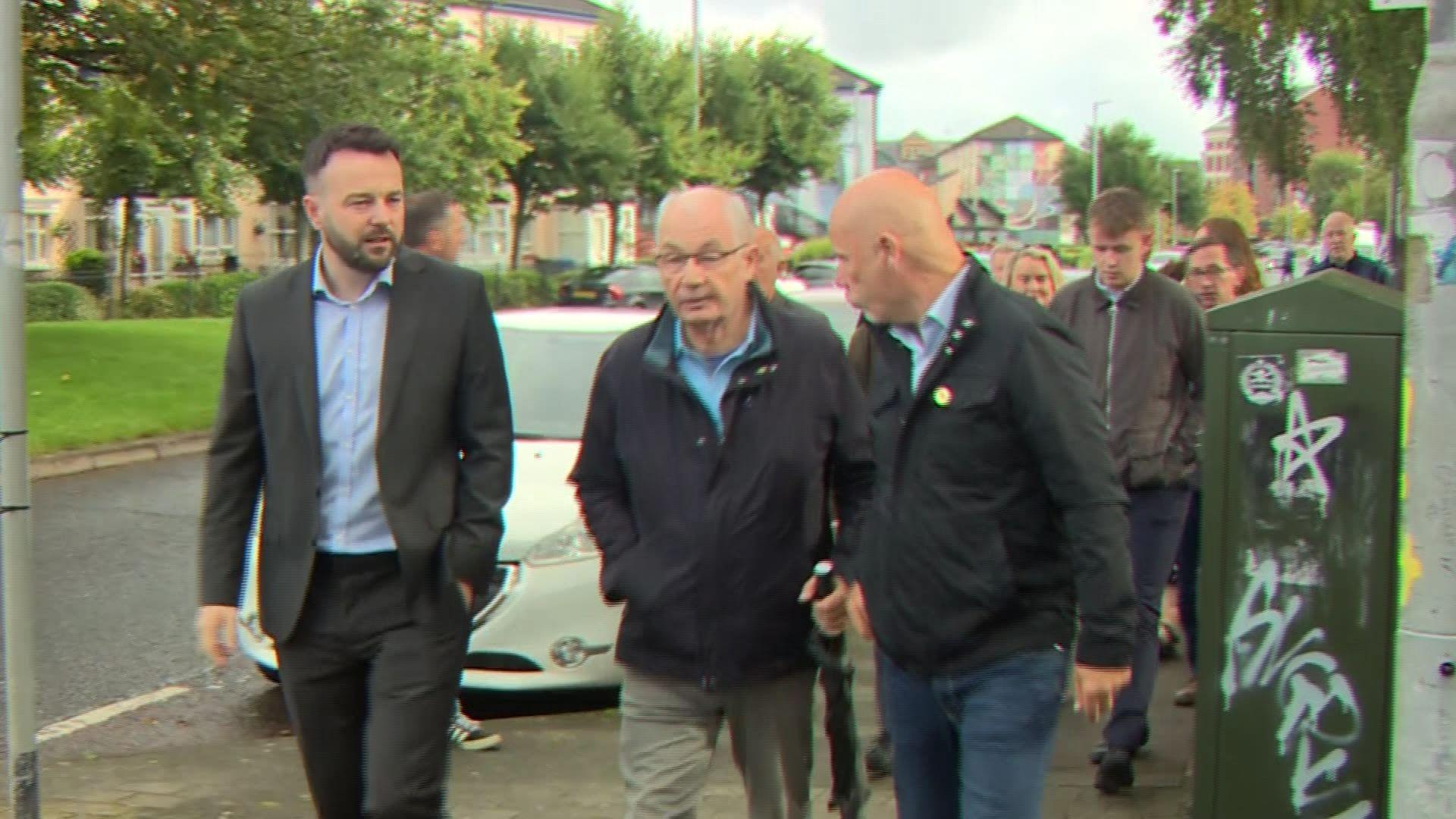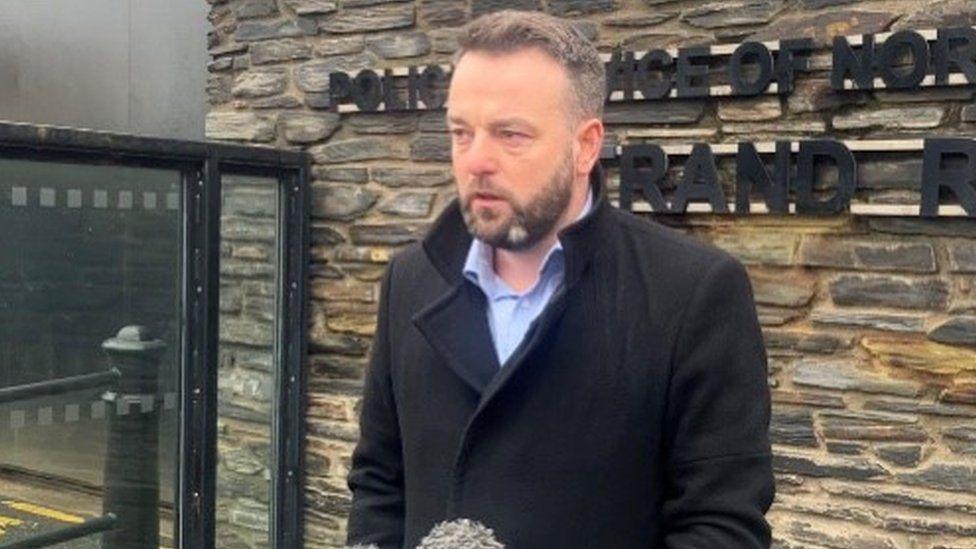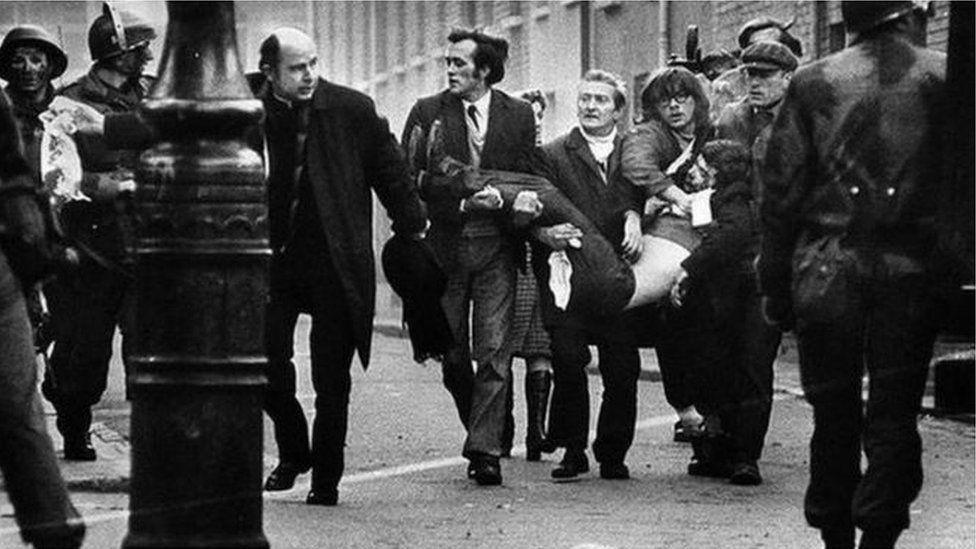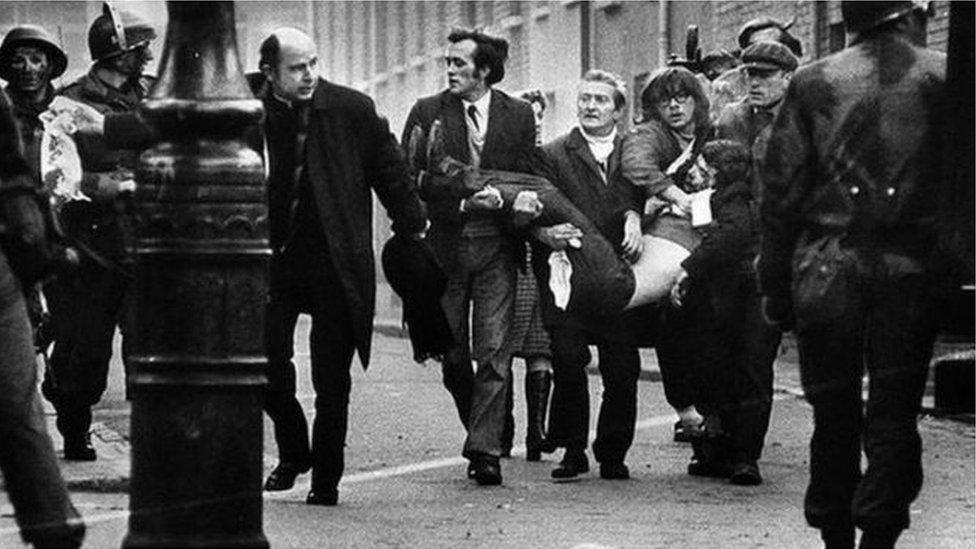MP gets PSNI apology for Bloody Sunday walk inquiry

Colum Eastwood accompanied relatives of some of the victims of Bloody Sunday to a court hearing in Londonderry last year
- Published
Colum Eastwood says the Police Service of Northern Ireland (PSNI) chief constable has apologised to him over an investigation into a walk he took part in with Bloody Sunday families.
Social Democratic and Labour Party (SDLP) leader Mr Eastwood accompanied relatives of some of the victims to a court hearing in Londonderry involving an ex-soldier accused of crimes including murder on Bloody Sunday.
In January police submitted a file to the Public Prosecution Service (PPS) reporting seven people.
On Thursday the PPS said it was not in the public interest to charge the Foyle MP and the others.
Soldier F is accused of two murders and five attempted murders on Bloody Sunday.

SDLP MP Colum Eastwood described the police investigation as a "farce"
Mr Eastwood described the PPS decision as “the right one” and said Chief Constable Jon Boutcher had apologised to him after he was asked to attend Strand Road police station in Derry in December.
"The area commander phoned me first, then Jon Boutcher phoned me over the weekend," he told BBC Radio Foyle's North West Today.
“The PSNI have handled it terribly,” Mr Eastwood said.
“Of course, the PPS were going to throw this out. They had no choice but to throw this out because it’s ridiculous.
“It wasn’t a planned parade, it wasn’t a protest, it was a walk up a street, it didn’t give any offence to anybody.
Thirteen people were killed and 15 wounded on Bloody Sunday on 30 January 1972, when soldiers from the Parachute Regiment opened fire on protestors.
A former British soldier, known as Soldier F, is to stand trial for the murders of William McKinney and James Wray, plus five counts of attempted murder.
In Northern Ireland you must give 28 days' notice if you want to hold a parade or procession.
William McKinney’s brother, Mickey, is one of the other six people who were investigated for walking to the courthouse in August.
He said he felt “let down” by the PSNI and called for a public apology.
“Outside of a five-minute walk, going up Bishop Street, we didn’t disrupt anything, we didn’t cause any bother,” he said.
“We all know the reason we did it was because the [Soldier F] case was being carried on again.
“We were let down.”
'Decision raises questions'

Thirteen people were killed and 15 wounded on Bloody Sunday on 30 January 1972
Democratic Unionist Party assembly member for Foyle, Gary Middleton, said that the decision by the PPS raised "questions about consistency".
“Everyone should be equal under the law and equally subject to the law," he said in a statement.
"In this case the Public Prosecution Service seems to have abandoned that approach.
"The case raises questions about the consistency of approach from the Public Prosecution Service, particularly if they take forward prosecutions in the future.”
'Victory for common sense'
Solicitor Ciaran Shiels, who represents a number of victims' families and also Mr Eastwood, said the PPS decision was “a victory for common sense”.
“This was a matter that never should have troubled the PPS, who have genuine and serious criminal cases that require to be progressed through the courts,” he said.
“The decision taken by the PPS was the only sensible and rational decision that could be taken in the circumstances."
Mr Shiels said the PSNI had "extremely serious questions to answer”.
He said he intended to lodge a complaint with the Police Ombudsman.
Speaking to BBC Radio Ulster's Evening Extra programme on Thursday, loyalist activist Jamie Bryson, who said he made the initial complaint to the PPS over the procession in Derry, told the programme he found the decision "extraordinary".
"A number of people in unionist and loyalist communities and loyal orders have been prosecuted for unnotified public processions over many years," he said.
"It is the first time that I can recall such a public interest test with that criteria being applied."
In a statement the PSNI said prior to submitting the file to the PPS its investigation had been conducted in line “with our statutory obligations”.
“We acknowledge their decision, and have nothing further to add at this time,” the PSNI said.
Related topics
- Published5 January 2024
